
table of contents
- Perennials for bees and insects
- Perennials up to 30 cm in height close to the ground
- Perennials for bees up to 60 cm tall
- From B - G
- From H -W
- Medium-sized perennials up to 100 cm in height
- From A - G
- From H - W
- Large perennial plants over 100 cm in height
- From
- From G - W
With countless petitions on bee protection, bees and insects and their importance for our ecosystem are now of political interest. Aside from politics, amateur gardeners have long known that they make a significant contribution to pollination, pest control and many other aspects of horticulture. Countless perennials make a significant contribution to transforming your garden into a paradise for bees and insects. Our list will help you make the right choice.
Perennials for bees and insects
First of all, it should be noted that there is no real black and white division, whether or not when a plant is bee-friendly or insect-friendly and when it is not. Instead, almost all plants offer the animals some form of nutrition, as a shelter or generally as a habitat. However, various plants are particularly good at attracting bees and insects. This is due to some essential aspects of their growth that directly benefit the animals:
- High nectar content per flower, or distributed over countless flowers, thus large food supply
- intense colors, thus great signaling effect on insects
- strong, but partly only perceptible scent for bees, thus easy to find food source
- long flowering period or Multiple flower shoots per season, thus long available food supply
Our list below includes perennials that meet the requirements for bees and insects with flying colors. However, you should not limit yourself to the plants represented, but rather bees and insects through one as wide a variety as possible prepare a varied offer that can be used all year round.
Perennials up to 30 cm in height close to the ground
Low-growing plants are particularly suitable for flat designs, as well as a transition between higher plants and paths, lawns, etc. As a solitary plant, on the other hand, they quickly fall behind and offer possibilities especially for small beds, plant pots or planting along the road.
Medicinal thyme / Quendel
- bot. Name: Thymus pulegioides
- Height: 5 to 30 cm
- Flower color: light purple
- Flowering period: May to October
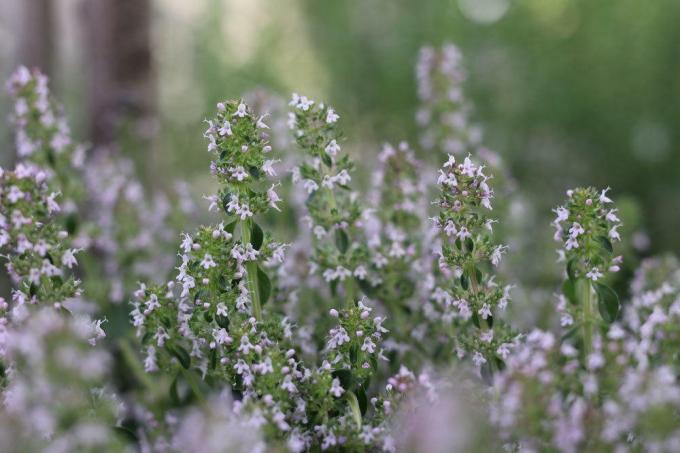
Garden sage
- bot. Name: Salvia officinalis
- Height: 30 cm
- Flower color: medium blue
- Flowering period: June to September
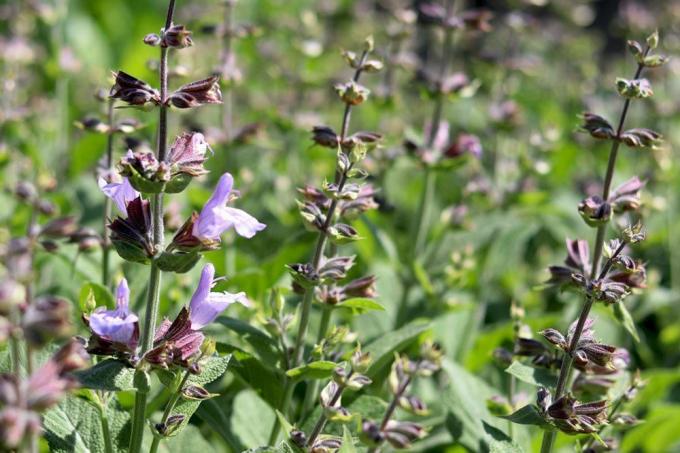
Spotted dead nettle
- bot. Name: Lamium maculatum
- Height: 25 cm
- Flower color: red-violet
- Flowering period: May to July

Gold nettle / dead nettle
- bot. Name: Lamium galeobdolon
- Height: 20 cm
- Flower color: yellow
- Flowering period: May to June
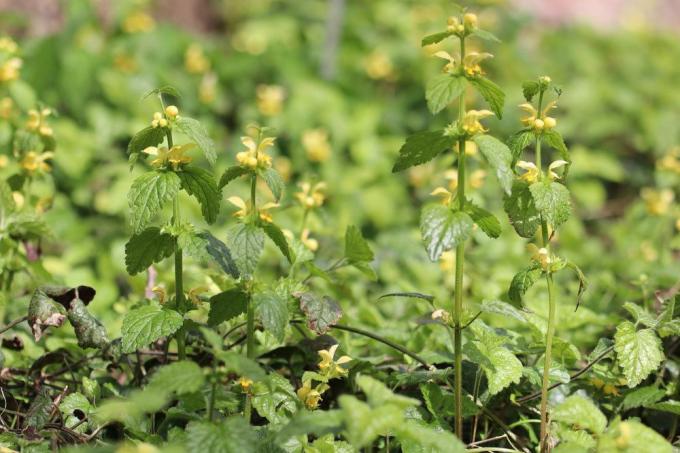
Big Brunelle / Braunelle
- bot. Name: Prunella grandiflora
- Height: 10 cm
- Flower color: violet blue
- Flowering period: June to September
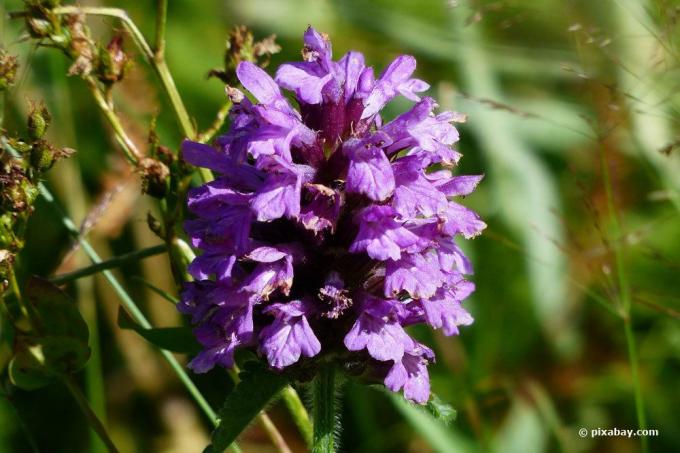
Great speed award
- bot. Name: Veronica Teucrium
- Height: 25 to 30 cm
- Flower color: deep gentian blue
- Flowering period: May to July
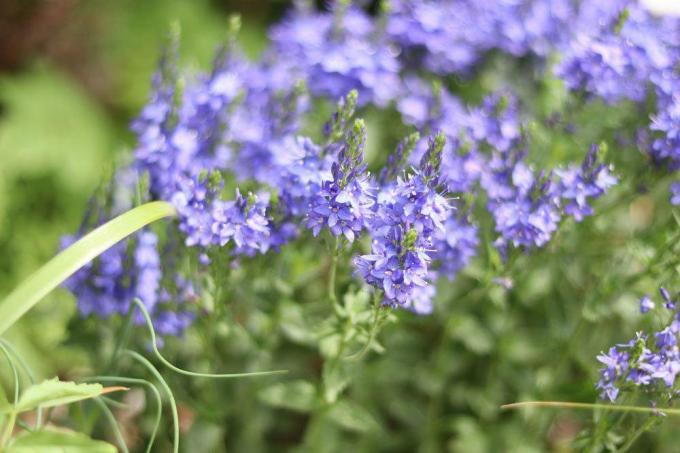
Round-leaved garden thyme
- bot. Name: Thymus serpyllum
- Height: 6 to 8cm
- Flower color: purple
- Flowering period: July to August
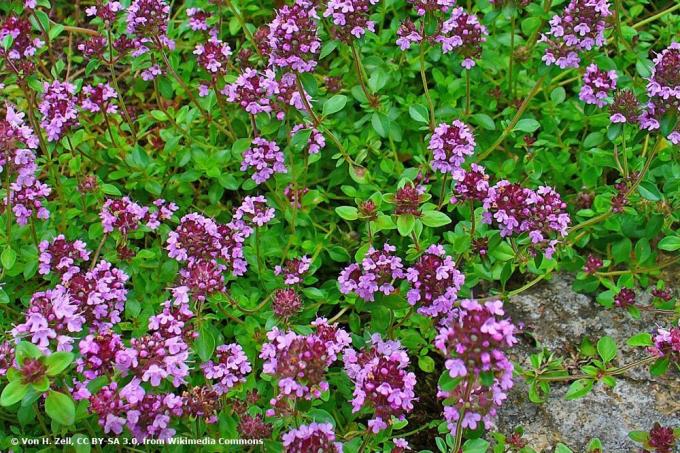
Perennials for bees up to 60 cm tall
Flowering plants of this size can be easily integrated into other plantings, as they occupy a mediating position between ground-covering and tall plants. On the one hand, they can still cover large areas, but on the other hand they can enrich smaller arrangements as protruding solitaires. And by the way, you can lure the bees into the garden with these perennials.
From B - G
Mustard
- bot. Name: Dianthus barbatus
- Height: 50 cm
- Flower color: bright purple
- Flowering period: May to August

Mountain knapweed
- bot. Name: Centaurea montana
- Height: 50 cm
- Flower color: blue
- Flowering period: May to July

Real soap herb
- bot. Name: Saponaria officinalis
- Height: 60 cm
- Flower color: light pink
- Flowering period: June to September

Real verbena
- bot. Name: Verbena officinalis
- Height: 60 cm
- Flower color: light violet
- Flowering period: July to September
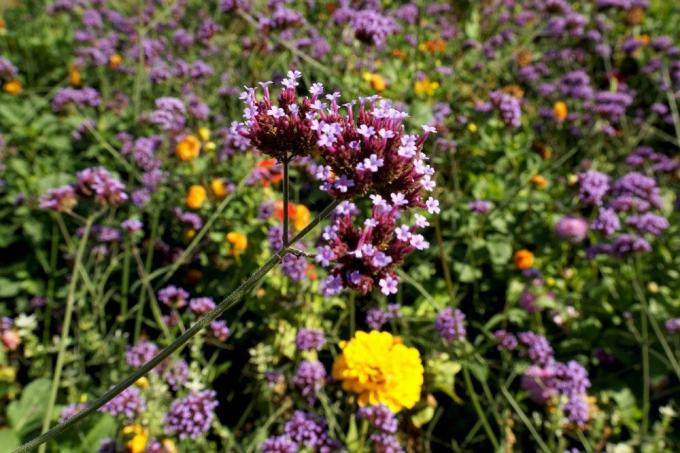
Garten-Blumen-Dost / Garten-Heidegünsel
- bot. Name: Origanum laevigatum
- Height: 40 cm
- Flower color: pink
- Flowering period: August to September

Chamois
- bot. Name: Doronicum
- Height: 50 cm
- Flower color: golden yellow
- Flowering period: April to May

Garden ball bellflower
- bot. Name: Campanula glomerata
- Height: 50 cm
- Flower color: dark purple
- Flowering period: June to August
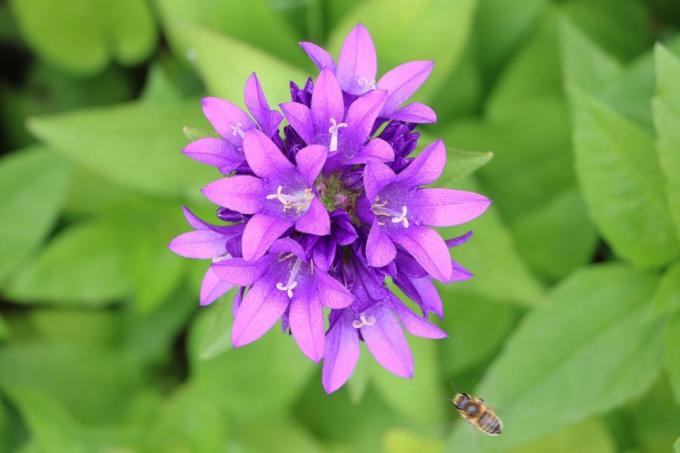
Yellow thimble
- bot. Name: Digitalis Lutea
- Height: 60 cm
- Flower color: light lemon yellow
- Flowering period: June to August

Gold daisy / ox-eye
- bot. Name: Buphthalmum salicifolium
- Height: 50 cm
- Flower color: golden yellow
- Flowering period: July to August

Large garden fat leaf
- bot. Name: Sedum telephium
- Height: 50 cm
- Flower color: brown-red
- Flowering period: August to October

Large star umbels
- bot. Name: Astrantia major
- Height: 60 cm
- Flower color: gray-white
- Flowering period: June to August

From H -W
Heil-Ziest
- bot. Name: Stachys officinalis
- Height: 50 cm
- Flower color: purple-pink
- Flowering period: July to August

Native globe flower / globe flower
- bot. Name: Trollius europaeus
- Height: 60 cm
- Flower color: bright yellow
- Flowering period: May to June
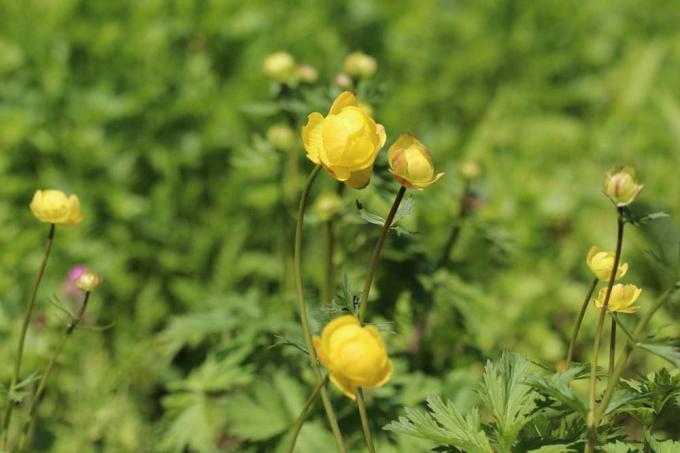
Carthusian Carnation
- bot. Name: Dianthus carthusianorum
- Height: 40 cm
- Flower color: rose red
- Flowering period: June to September
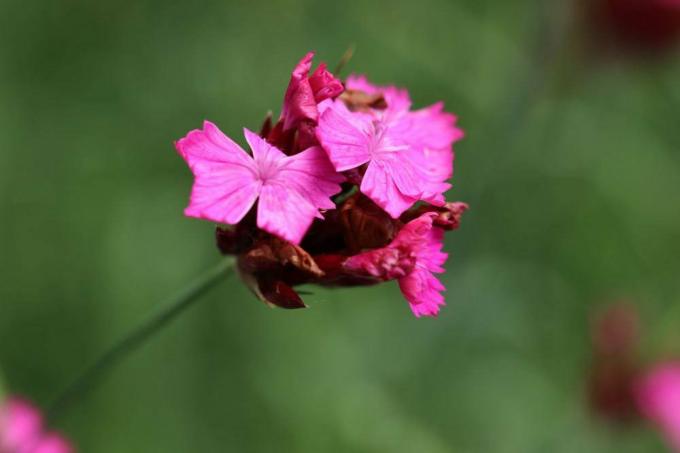
Cuckoo carnation
- bot. Name: Lychnis flos-cuculi
- Height: 40 cm
- Flower color: pink
- Flowering period: May to July
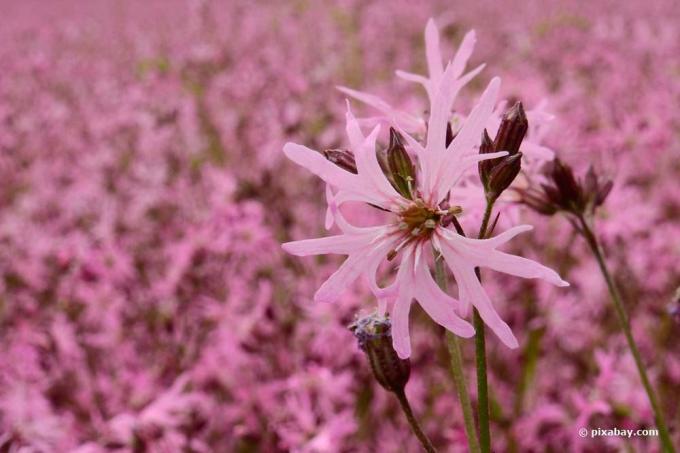
Macedonian scabious
- bot. Name: Knautia macedonica
- Height: 60 cm
- Flower color: dark red
- Flowering period: June to October
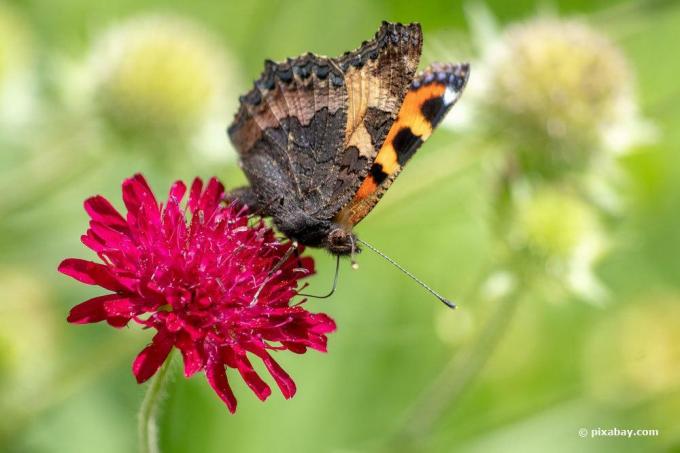
Magnificent garden sun hat
- bot. Name: Rudbeckia fulgida var. sullivantii
- Height: 60 cm
- Flower color: golden yellow
- Flowering period: July to October

Deciduous germander
- bot. Name: Teucrium Chamaedrys
- Height: 35 cm
- Flower color: purple-pink
- Flowering period: July to August
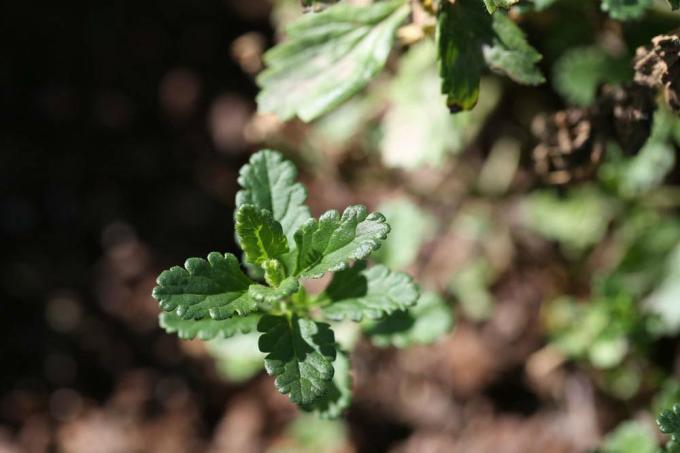
Bulky autumn aster
- bot. Name: Aster Divaricatus
- Height: 40 cm
- Flower color: white with dark stems
- Flowering period: July to September
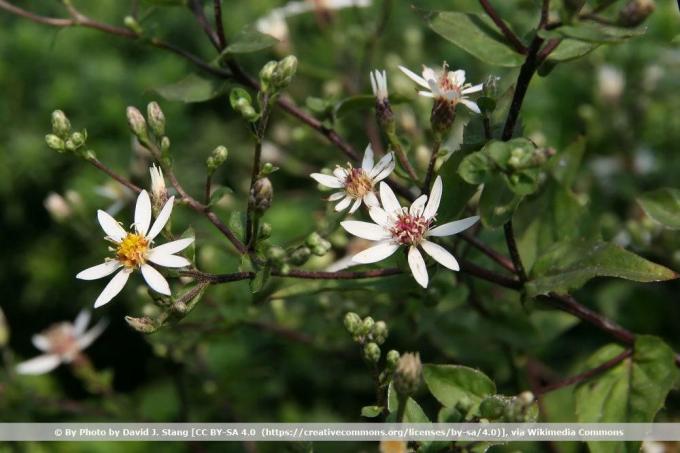
Steinquendel
- bot. Name: Calamintha nepeta
- Height: 40 cm
- Flower color: light purple or white
- Flowering period: July to September

Pigeon scabiosis
- bot. Name: Scabiosa Columbaria
- Height: 40 cm
- Flower color: pale blue
- Flowering period: May to October
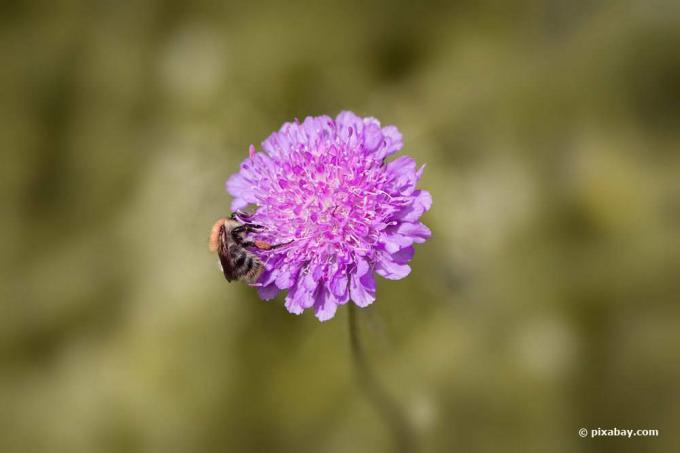
Meadow daisy
- bot. Name: Leucanthemum Vulgare
- Height: 60 cm
- Flower color: white
- Flowering period: May to June

Meadow cranesbill
- bot. Name: Geranium Pratense
- Height: 40 cm
- Flower color: purple-white-pink
- Flowering period: May to July
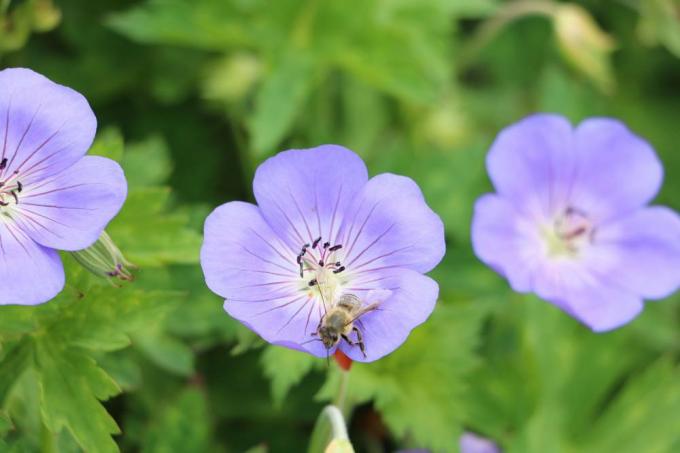
Medium-sized perennials up to 100 cm in height
Medium-sized plants and perennials will probably make up the bulk of the plantings in many gardens for bees. Both in plant groups and as impressive individual perennials, they offer great scope for design. Due to the wide range of possible sizes, they are usually able to convey a gradation of the stature and create a harmonious visual appearance.
From A - G
Algiers mallow
- bot. Name: Malva sylvestris
- Height: 100 cm
- Flower color: violet, darkly striped
- Flowering period: June to October

Amstelraute
- bot. Name: Thalictrum aquilegifolium
- Height: 100 cm
- Flower color: purple-pink
- Flowering period: May to July

Burning bush / diptame
- bot. Name: Dictamnus albus
- Height: 70 cm
- Flower color: dark pink
- Flowering period: May to June

Scented nettle
- bot. Name: Agastache
- Height: 70 cm
- Flower color: blue-violet
- Flowering period: July to September

Real cat mint
- bot. Name: Nepeta cataria
- Height: 70 cm
- Flower color: white, spotted with red
- Flowering period: July to September
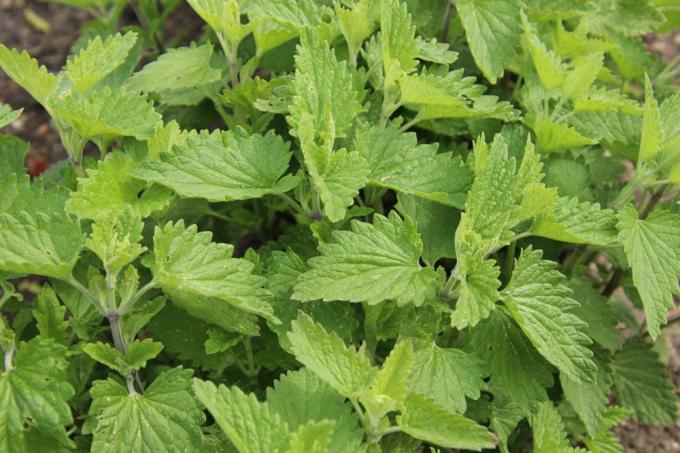
Monkshood
- bot. Name: Acontium
- Height: 100 cm
- Flower color: blue-violet
- Flowering period: July to August
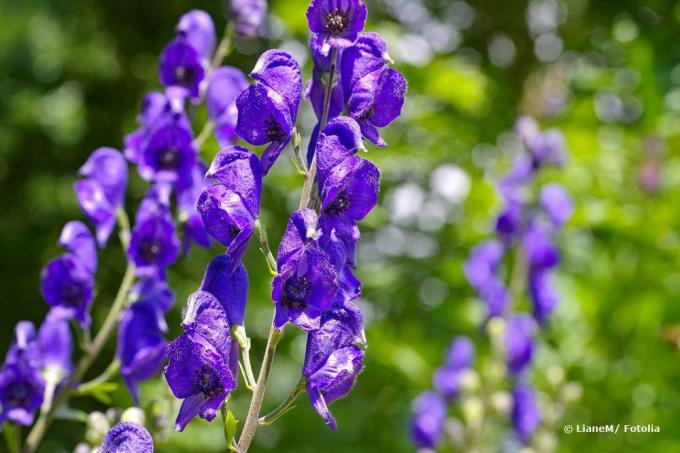
Garden catnip
- bot. Name: Nepeta faassenii
- Height: 50 to 80 cm
- Flower color: violet blue
- Flowering period: June to September

Common Columbine
- bot. Name: Aquilegia vulgaris
- Height: 60 to 70 cm
- Flower color: pink and blue pastel shades
- Flowering period: May to June
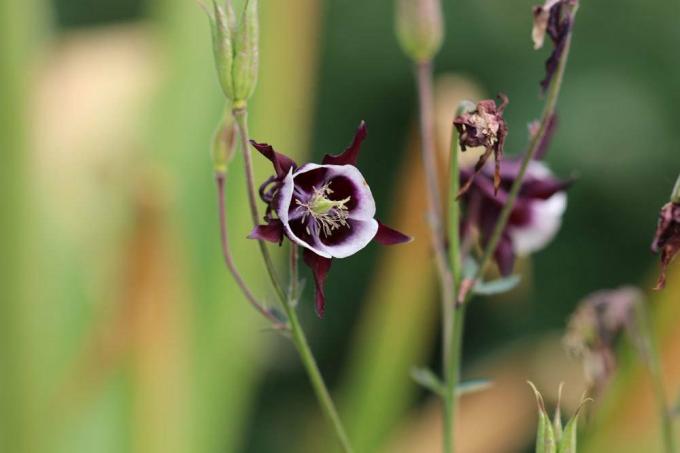
Large-flowered foxglove
- bot. Name: Digitalis grandiflora
- Height: 80 cm
- Flower color: light yellow
- Flowering period: June to August
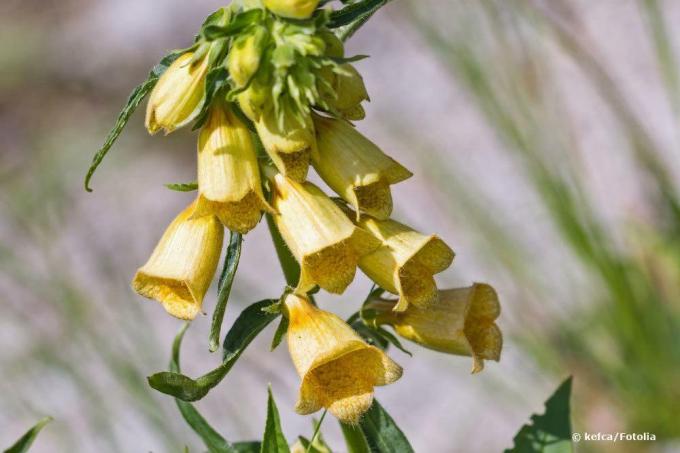
Large-flowered bill-elephant / Telekie
- bot. Name: Telekia speciosa
- Height: 150 to 180 cm
- Flower color: yellow
- Flowering period: July to August
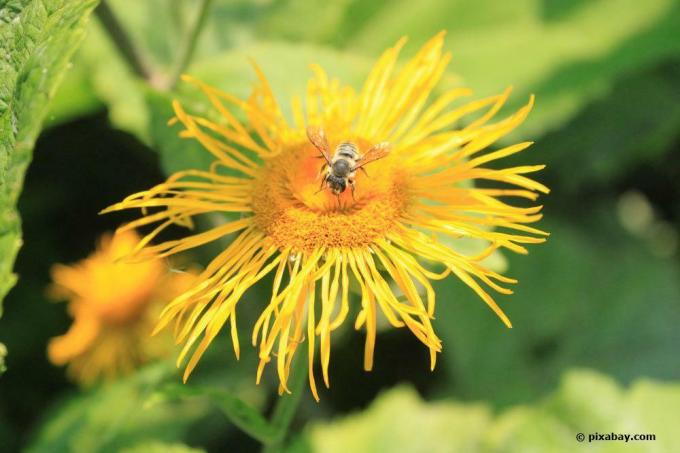
From H - W
Ladder to Heaven / Jacob's Ladder / Barrier Weed
- bot. Name: Polemonium caeruleum
- Height: 80 cm
- Flower color: blue
- Flowering period: June to July

Clary Sage
- bot. Name: Salvia sclarea
- Height: 100 cm
- Flower color: light purple
- Flowering period: June to August

Nettle-leaved scented nettle
- bot. Name: Agastache Rugosa
- Height: 80 cm
- Flower color: purple
- Flowering period: August
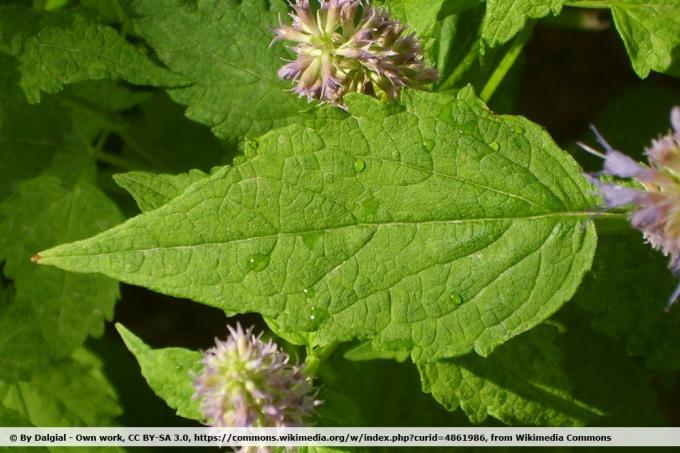
Nettle-leaved bellflower
- bot. Name: Campanula Trachelium
- Height: 80 cm
- Flower color: purple
- Flowering period: July to August

Note: One reads again and again about an alleged toxicity of the bellflower. Admittedly, harmful effects cannot be completely ruled out due to the large number of plants belonging to the bluebells. However, no documented poisoning from the various perennials is known to date! On the other hand, they are always bee-friendly and generally insect-friendly and are worth considering when planning your garden!
Przewalski candle gold flask
- bot. Name: Ligularia przewalskii
- Height: 100 cm
- Flower color: yellow
- Flowering period: July to August

Rose poplar / rose mallow
- bot. Name: Malva alcea
- Height: 80 cm
- Flower color: pink
- Flowering period: June to September

Mock sun hat
- bot. Name: Echinacea Purpurea
- Height: 100 cm
- Flower color: carmine red
- Flowering period: July to September
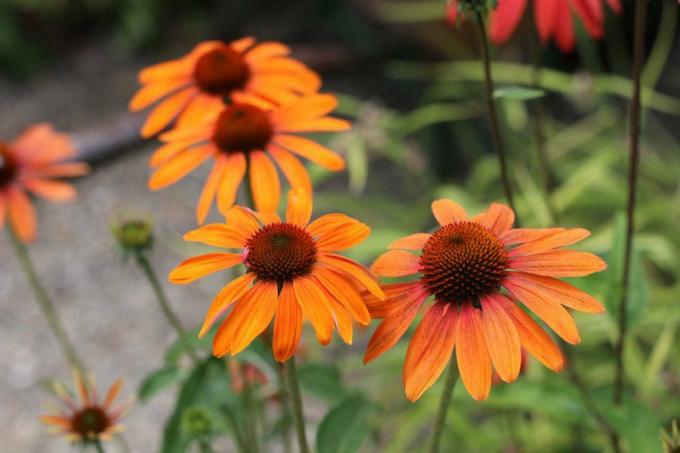
Marsh meadowsweet
- bot. Name: Filipendula ulmaria
- Height: 100 cm
- Flower color: creamy white
- Flowering period: June to August
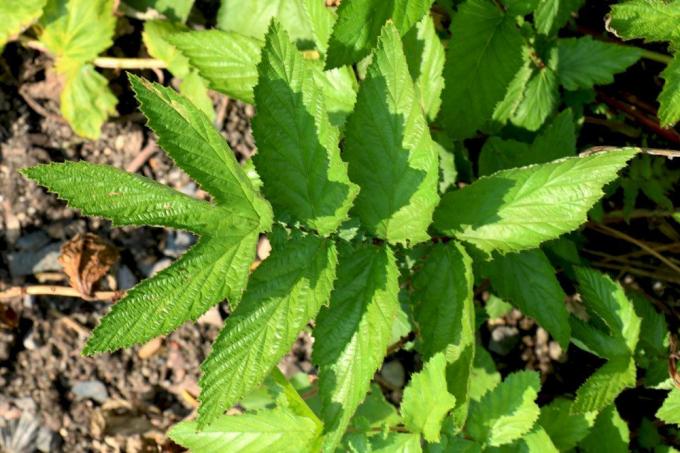
Forest bellflower
- bot. Name: Campanula Latifolia var Macrantha
- Height: 100 cm
- Flower color: deep purple
- Flowering period: June to July
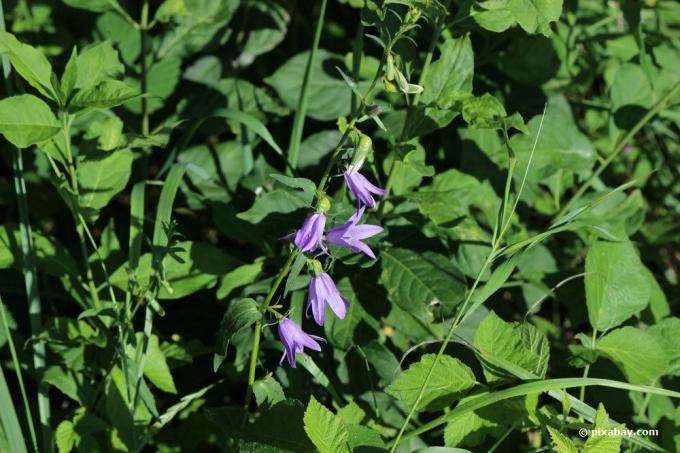
Large perennial plants over 100 cm in height
If plants reach heights of more than one meter, they are particularly suitable as concise solitary plantings in beds with low vegetation. You can also decoratively shield house walls and sometimes even create a certain privacy screen. However, their height also leads to shading or Impairment of the view of normal windows, so that the choice of location should be well chosen.
From
Afghanistan Alant / Giant Alant
- bot. Name: Inula magnifica
- Height: 200 cm
- Flower color: yellow
- Flowering period: July to August
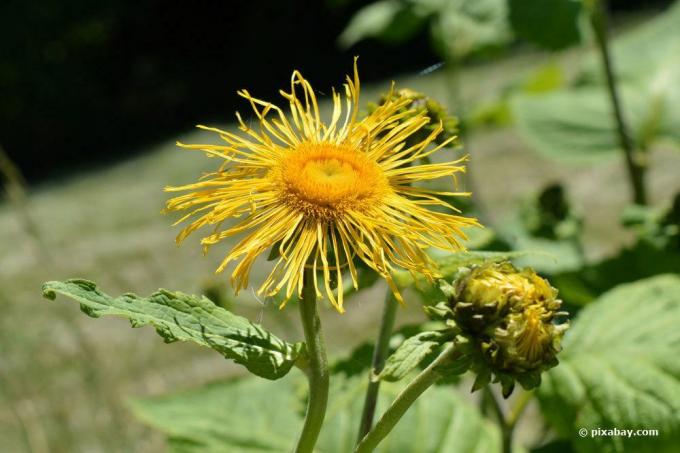
Argentine verbena
- bot. Name: Verbena bonariensis
- Height: 130 cm
- Flower color: purple
- Flowering period: July to October

Arkansas Note Aaster / Ufer Note Aster
- bot. Name: Vernonia crinita
- Height: 150 to 200 cm
- Flower color: red deep purple
- Flowering period: September to October
Blood loosestrife
- bot. Name: Lythrum salicaria
- Height: 100 to 120 cm
- Flower color: lilac red
- Flowering period: July to August

From G - W
Yellow giant knapweed
- bot. Name: Centaurea macrocephala
- Height: 100 to 150 cm
- Flower color: bright yellow
- Flowering period: July to August

Common water feast / Kunigunden herb
- bot. Name: Eupatorium cannabinum
- Height: 120 cm
- Flower color: pink
- Flowering period: July to September

Large-flowered mullein / woolly flower
- bot. Name: Verbascum densiflorum
- Height: 120 cm
- Flower color: lemon yellow
- Flowering period: July to August

Big ox tongue
- bot. Name: Anchusa azurea
- Height: 100 to 130 cm
- Flower color: blue
- Flowering period: June to July
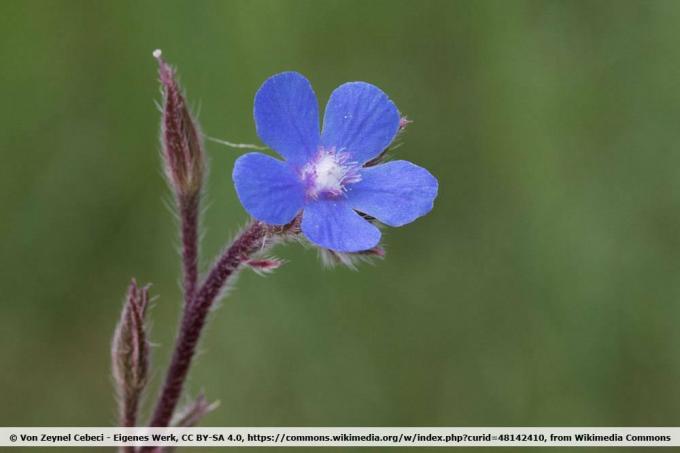
Hohe Beet-Garbe / Hohe Edel-Garbe
- bot. Name: Achillea filipendulina
- Height: 120 cm
- Flower color: golden yellow
- Flowering period: June to September

Red-flowering foxglove
- bot. Name: Digitalis purpurea
- Height: 120 cm
- Flower color: red
- Flowering period: June to July
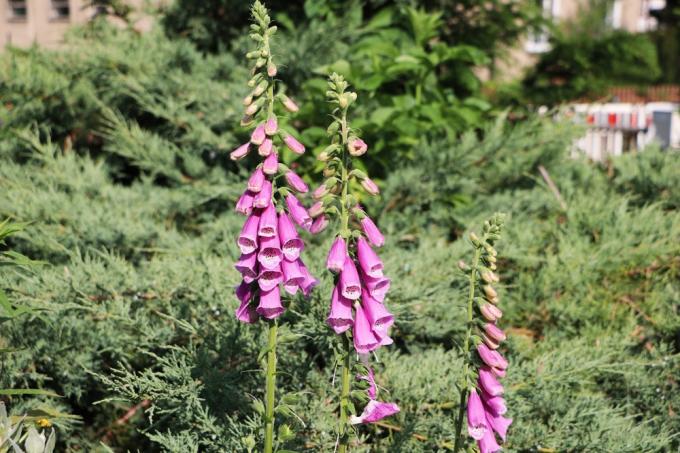
Attention: The representatives of the foxglove family are all considered to be poisonous and can also seriously affect people. But since they are very bee-friendly, careful handling of the perennials in your own garden is definitely worth it!
Forest goat's beard
- bot. Name: Aruncus dioicus
- Height: 180 cm
- Flower color: white
- Flowering period: June to July

From the abundance of the named perennials there are plants for almost every garden that are bee-friendly or are insect friendly. In addition to the bees, it is often worth taking a second look at the other properties of the individual plants. In this way, under certain circumstances, further advantages can be achieved by selecting the “right” representatives.
Because while flowers and nectar are on the one hand attractive to bees, the perennial can, for example the scent has a deterrent effect on pests or even in the prevention of disease help. In this way you kill several birds with one stone and, in addition to the bees, gain numerous other useful aspects for the benefit of your garden.
